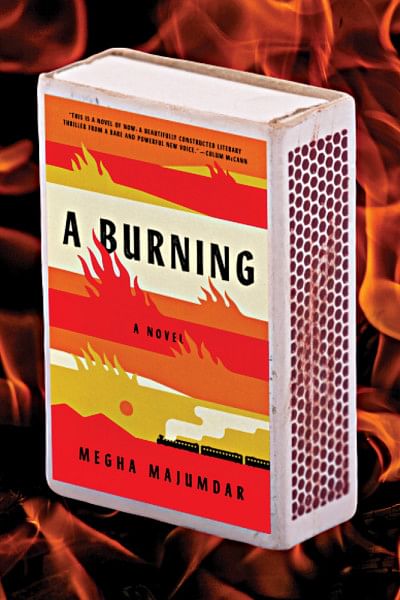An Ominous Incense

There are two things that I believe are enough to make me lose my sanity during times of unrest—scrolling down my Facebook feed and the afternoon TV news. The characters in Megha Majumdar's new novel, A Burning (2020), become unavoidably embroiled in both.
Majumdar deftly conjures up a tense air while narrating the events following a terrorist attack. A Bengali Muslim woman (who is oddly named Jivan) takes the fall for the incident just because she had written a post on Facebook, and the pundits on TV news and the agitated social media mob pounce on her like hungry wolves.
It is not hard to see why this novel has created such buzz in the literary and publishing circles abroad. Megha Majumdar writes with a great sense of awareness and sensitivity and her focus on the dimensions of social and political ethos is commendable. However, the novel also has all the elements the Western audiences crave—a terrorist attack, a Muslim falsely blamed, misinterpreted social media posts, and token representations of oppressed minority groups. It almost feels like she is ticking boxes for a liberal audience who want to pat themselves on the back for having read this book. Yet, despite its adoration in the West, the novel takes place quite close to home for a Bengali reader such as myself. The eponymous "burning" takes place in a railway station in Kolkata.
Tension between Hindus and Muslims are nothing new in our subcontinent. It resulted in the anomalous partition in 1947 and the riots that ensued around that period. State-sponsored pogroms in Gujarat have killed thousands of Muslims since then. The eviction of countless Hindus from their ancestral homes in Bangladesh have been supported or tolerated by ruling parties in the past. Majumdar's novel is brilliant in chalking out this nationalistic jingoism that is often associated with the oppression of a minority group. It skillfully addresses how the state is complicit in these acts of violence—Jivan is framed for sedition, her execution is hastened, and she becomes a victim of those playing for power. Her allegiance to the state is repeatedly questioned during the legal trial she has to face. While she is walking to the court one day, an angry voice from the mob yells, "Go back to Bangladesh."
Jivan's fate rests in the hands of another central character, Lovely, a member of the hijra community. Lovely exudes great personal resolve and strength. She is determined to be an actress despite facing constant ridicule and hardship. Majumdar depicts with great sensitivity how someone like Lovely faces discrimination and hatred in society, but what falls flat is how she attempts to render the diction of Lovely's speech with an odd caricature of broken English. "In this life, everybody is knowing how to give me shame. So I am learning how to reflect shame on them also."
Both Lovely and Jivan live in a slum. Literature and art often portray a one dimensional picture of people in the low socioeconomic class—though middle-class figures have complex persona and inter-personal dynamics, there is a banality of seeing only the poverty of these people from the surface. Majumdar's novel falls for a similar trope when Jivan is recounting her childhood to a journalist. But, inexplicably, she makes no mention of the discrimination she undoubtedly had to face while growing up as a woman and a Muslim in a patriarchal society where Hindus are the majority. The mass outcry against her seemingly comes only from their need to find a scapegoat and attempts at vilifying her are strangely unaffected by her gender or religion, in an otherwise polyphonic narrative.
The third notable character, with whom we are less likely to sympathise, doesn't get a name in the book. He is merely referred to as PT Sir—Jivan's physical education teacher from school. Despite his initial affections for Jivan, he gives false statement in court against her in the hope of gaining ranks in a political party where they don't blink twice when innocent Muslim families are butchered by cow vigilantes. His personal insecurities make him vulnerable to manipulation and his arc reflects how our individual derangements can affect facets of oppression on a grand scale.
The rise of right wing governments across the globe has made us wary of our future. Megha Majumdar's A Burning offers a gloomy account of this tumultuous world, where the vile like PT Sir ascend the stairs of power at the expense of the most vulnerable members of the society like Jivan. The novel's tone gives it a zealous fervor. It depicts life as it appears on the news—a bit dizzying and nauseating, but often inevitable.
Mursalin Mosaddeque grew up in the suburban town of Rangpur in Northern Bengal. He can be found @bluets001 on Instagram.

 For all latest news, follow The Daily Star's Google News channel.
For all latest news, follow The Daily Star's Google News channel. 



Comments